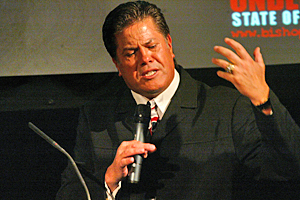
The Destiny Church's covenant demands total support for their 'spiritual father' Brian Tamaki - even when he makes a mistake. (image: Hawkes Bay Today)
A bit of local content… Destiny Church ‘sons’ swear oath of loyalty — NZ Herald
Meanwhile in the US:
Follow up article on Paul Haggis’ defection from Scientology (politicsdaily.com)
When the Haggis letter emerged, Davis responded quickly and strenuously, telling the Associated Press that the church does not mandate “disconnection” for anyone and that such a break is a completely “self-determined decision.” (Regarding the Prop. 8 question, Davis’ comment was more vague: he didn’t say whether or not the church supported or opposed the measure: “We’re all for civil rights and the rights of minorities,” Davis told the AP. “We know what it is to be a minority and have your rights curtailed. We’re very vocal and consistent in our stance on discrimination against anybody. We take it very seriously.”)
Is this revelation, then, conclusive proof that Scientology is the cult that many claim? It all depends on what is meant by “cult.”
The word really has two meanings. One is the original sense of any regular practice of faith and body of beliefs. But since the middle of the last century and the rise of what are now generically termed “New Religious Movements,” or NRMs — such as Scientology — the word “cult” has been used as a pejorative label slapped on anything that seemed odd or evil. (Or from California.)
Charles Manson’s cabal was called a cult, as were the followers of Jim Jones, who committed mass suicide at their community in Guyana in 1978. The Branch Davidians, led by David Koresh, who perished in an FBI siege in Waco in 1993 were considered a cult, as is the Fundamentalist Church of Jesus Christ of Latter Day Saints (FLDS) led by the now-jailed Warren Jeffs, who promoted polygamy and sex with underage girls.
Given such associations, it’s no surprise that no one wants to be known as a cult, and that the term has become so loaded that experts in religion caution against using it. So is there any such thing as a cult? The commonly accepted definition of a cult today is anything that is “weird” or new or well out of the mainstream. (Scientology claims 10 million members worldwide. Others say the global figure is closer to 100,000, and a large-scale national survey in 2001 put the number of U.S. followers at 55,000.)


Then there’s this:
Tamaki’s church becoming a cult — NZ Herald
Wow. Someone has just emailed me the Destiny Church ‘Protocols and Requirements’ (the ‘covenant’ document).
It’s awful. The obsequiousness demanded by ‘Bishop Tamaki’ is nauseating in detail. I gagged several times while reading it. It is truly disturbing. Let me acknowledge that neither the Bishop, his wife nor their followers will give the proverbial rat’s backside for what I think, but so what?
“Bishop carries our vision and our anointing for the future and hope of our families and offspring; we ought to guard, protect and watch out for him and Ps Hannah.”
“Quote him as often as possible in favourable terms”
“Acknowledgement to others that Bishop has made your life what it is gives credit to God as he is one of the most well known representatives of God in our country.”
Oh dear. For the “father of the movement” to issue fan club rules like this is sad.
“Remember, honour is the principle of release” — is that Amway?
(Email me through the address here if you want to get a copy. Bleurgh!)
Brian Tamaki’s reply | Stuff.co.nz
Continued… Sunday Star Times